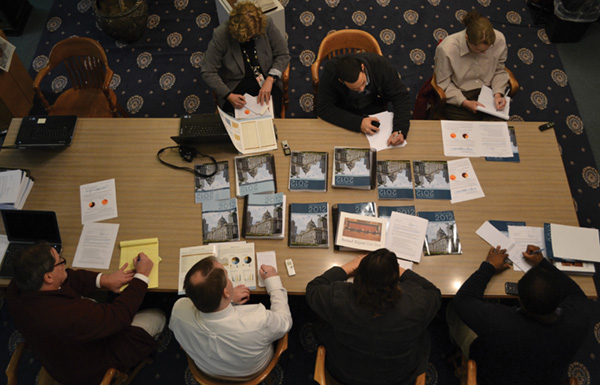
With 1.6 million new cases filed in Indiana trial courts and the launch of a new website that allows court statistics to be compared, there was plenty to talk about at a recent press conference.
Statewide media gathered in the Supreme Court Law Library on November 4th to review several reports released by the Supreme Court. The 2012 Judicial Service Report, Probation Report, the Supreme Court Annual Report, and a new website with comparative data were available for examination. The reports offer an opportunity to review court operations at the county and statewide level for trial and appellate courts.
- Some of the reported information includes:
- 1,005 cases were disposed by the Indiana Supreme Court
- 1,338 civil and criminal jury trials were held statewide
- 307,612 cases statewide included an individual who went to court without a lawyer
- 235 murder cases were filed in trial courts
- 33,876 mortgage foreclosures were filed in the state
- 11,325 Child In Need of Services (CHINS) cases were filed
- An interpreter was used in 11,564 trial court cases
- 5,900 cases statewide were referred to Alternative Dispute Resolution
- 124,322 adults were under supervision by court probation departments
- Filing fees, court costs, user fees, and fines generated $205 million in revenue
Chief Justice Brent E. Dickson and Executive Director of Division of State Court Administration Lilia Judson led the conversation with reporters and fielded a range of questions about:
- the Supreme Court’s caseload and how the Court manages it
- what goes into the Supreme Court’s decision to grant or deny transfer of a case
- how and why certain fees are collected
Another topic of interest to the reporters was the growth of Indiana Problem Solving Courts. Problem Solving Courts are specialized dockets for cases in which the court is actively engaged in monitoring defendants and the programs and services aimed at helping those defendants solve their problems such as substance abuse. Members of the Press inquired about what resources must be available in order for problem solving courts to be created in a county. The Chief Justice explained that courts, together with other stakeholders in their local communities decide if there is a need and then commit the necessary time and resources to implementing a drug court. He applauded the judges and communities that have succeeded in developing specialized courts.
The Supreme Court’s Office of Communication, Education and Outreach facilitated the exchange by setting up computers so that the member of the media could experience first-hand how to navigate the reports and to view the new website with comparative data.
For additional information on these reports please contact Brittany Babbitt at 317-234-8147 or [email protected].
The reports referenced above can be found online:
- 2012 Indiana Judicial Service Report and Probation Report: courts.in.gov/admin/3118.htm
- Supreme Court Annual Report: courts.in.gov/supreme/2484.htm
- Website with comparative data: publicaccess.courts.in.gov/ICOR/